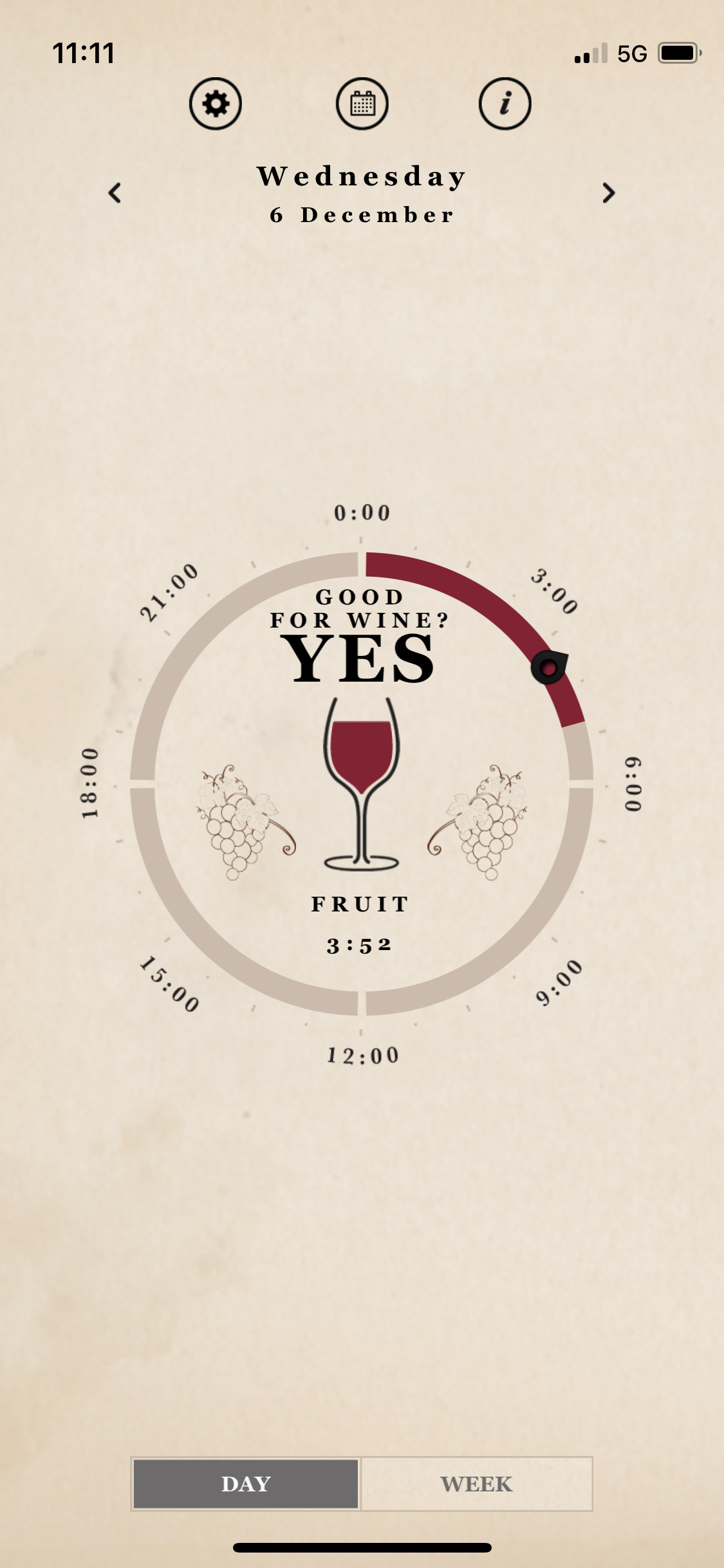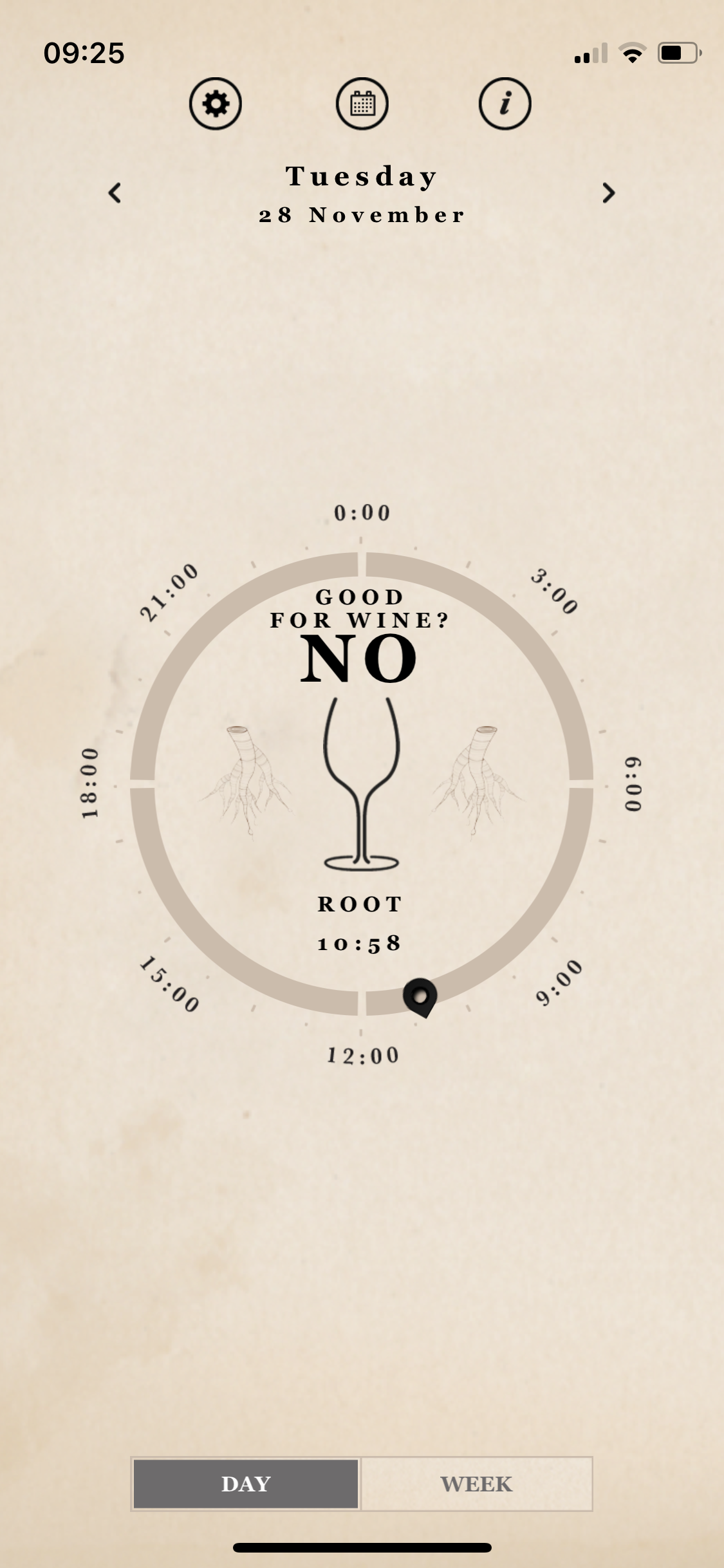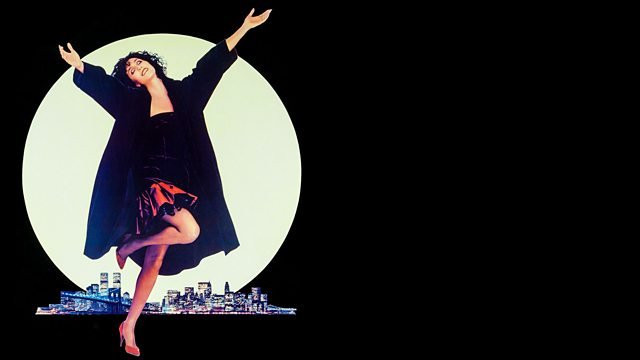What the hell is a Fruit Day?
Have you ever been drinking wine with someone and had them whip out their phone, open an app - and exclaim, "I knew it must be a fruit day! That's why this wine is drinking so well!"
A few months ago, I tasted at a winery in Volnay (a very good one, but I'll leave out the name), and the winemaker said, deadpan, "Well, it's a root day, so these wines won't be very open." This tasting occurred at the end of the harvest season, and this winemaker was waiting for the full moon to pass (the upcoming Sunday) to dig out his tanks. It was hard for me to fully comprehend that a winemaker whom I admire so much and whose wines I consistently adore could rely so heavily on the lunar calendar to make major winemaking decisions.
This led me to question — what the hell is a fruit day? And should I even care?
The ConceptOver the last few years, the term "biodynamic" has become commonplace in many wine lover's vocabulary. Especially in the ever-popular world of natural wine. Phrases like "Organic, biodynamic, nothing added, nothing taken away" with their almost singsong rhyme have become painfully familiar to anyone engaged in popular wine discourse. Online, these phrases are generally followed by a slew of similar hashtags #raw #natty #juice #dontdrinkdeadwine #zerozero etc.
The biodynamic movement was started by Austrian philosopher Rudolf Steiner in 1924. The Biodynamic Farming and Gardening Association defines biodynamics as "a spiritual-ethical-ecological approach to agriculture, gardens, food production and nutrition." Biodynamic farming begins with organic practices, abstaining from the use of synthetic fertilizers, pesticides and herbicides. The biodynamic philosophy uniquely considers the vineyard as one harmonious system, implementing rebalancing, regenerative, and revitalizing practices. Some biodynamic farmers coordinate soil treatments and vineyard work with astrological and lunar cycles.
An example of a standard biodynamic soil treatment is Preparation 500. This involves filling cow horns with manure and burying them over the winter. According to the Biodynamic Association of New Zealand, it is best to do this in autumn as "the Earth inhales during this time in a rhythmic process." It is also recommended to bury the horns "on a root day when the descending moon exerts the greatest pull down on the earth into the soil."
Preparation 500
As of 2018, there were ~550 certified biodynamic wineries in France. The most popular certifying bodies are Demeter and Biodyvin. It's also worth noting that many wineries practice various levels of biodynamics without ever choosing to certify.
Building on the lunar elements of Steiner's work, a German woman named Maria Thun created a gardening calendar considering all aspects of lunar cycles, solar cycles, star constellations and the movements of other planets. Her Biodynamic Sowing and Planting Calendar categorizes days into four groups: fruit, flower, leaf and root.
Fruit days are when the moon travels through fire signs (Sagittarius, Aries, Leo). Flower days are when the moon travels through air signs (Libra, Aquarius, Gemini). Leaf days are when the moon travels through water signs (Scorpio, Pisces, Cancer). Root days are when the moon travels through earth signs (Virgo, Capricorn, Taurus).
In the vineyard, the different days have recommended best practices, such as harvesting fruit on fruit days and working soil on root days.
Now, here's where things get interesting… Maria Thun's theory promotes that the moon influences all living things on Earth. This theory extends all the way from the vineyard into your wine glass. If wine responds to the moon's rhythms, then fruit and flower days are said to be best for drinking wine. On these days, wines will be expressive and vibrant. Root and leaf days are bad for tasting wine, and wines will be closed and taste muted on these days.
The AppThere are actually apps that make this information readily available in your pocket. With the When Wine App, you can instantly check what phase the moon is in and it’s whether it’s a fruit or root day. A paid upgrade in the app gives you access to the future calendar so you can plan the “best time” to open your special bottles.
Images from the When Wine App
Is this real?Although practiced and believed by many, there is little to no scientific evidence that supports the biodynamic philosophy. There has been even less research on the lunar cycle's effect on wine.
A 2017 study conducted in New Zealand had 19 participants blind taste 12 Pinot Noir wines. The tasters rated each wine four times, twice on a fruit day and twice on a root day. The study found no evidence to support the notion that wines taste differently across fruit and root days.
Much of what you read about the effects of the moon on wine tasting is anecdotal knowledge. A quote I found while researching this article displayed this well. Wine Rabbel writes, "I honestly can't tell you how or why my palate perfectly aligns with the calendar– it just does!" This is precisely the sort of explanation that can also be found in the "theory" section on the When Wine App.
For a deeper dive into the lunacy of biodynamics, please see Josh Dunning's article, Biodynamic farming: myths, quacks and pseudoscience - he gives a thoroughly researched, scathing review. I'll pull just one of my favourite quotes:
"In the best of these reviews, Linda Chalker-Scott notes that 'to date, there are no clear, consistent, or conclusive effects of biodynamic preparations on organically managed systems'. If published literature isn't your bag, one's own common sense suggests that a crackpot collection of homeopathic preparations proposed by a charlatan is unlikely to be a panacea for modern agricultural ailments."
ConclusionsI do not think that biodynamic wines are bad. There are good biodynamic wines, but they are not good only because they are biodynamic. In my experience, a positive correlation exists between time spent in the vineyard and the quality of wine being made. If a winemaker cares enough to prioritize all the wacky biodynamic stuff, such as paying attention to lunar cycles and burying cow horns, they may also be more in tune with their farming. The argument could be made that it's not the biodynamic practices but the extra time and care that contributes to a more qualitative end product.
As for tasting, it's subjective. Several physical factors can influence how you perceive a wine: the label, price, bottle condition, temperature, drinking environment, day and time…
Emotional factors can also influence your perception, such as mood, personal preferences, culture, health, expectations, and/or persuasions…
A shitty rosé on a terraced café on your first solo trip to Europe can taste like the best wine you've ever had. A glass of Grand Cru Burg can taste like nothing if you're drinking it after the loss of a loved one. Even professional wine critics have off tasting days.
If you truly believe that wine tastes better on a fruit day, then to you, it probably does. This belief will continue to be perpetuated by your confirmation bias.
Finally, the romantic sentiment of astrological influence, like the moon pulling on the tides of one's emotions, is not lost on me. I love Cher and Nicolas Cage in the 1987 hit Moonstruck. But these make for lovely metaphors and cheesy films, that is all.
PLEASE drink your wine when you want, fruit day or not.
Sante!
Cher, Moonstruck (1987)





